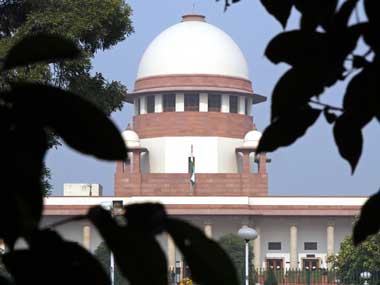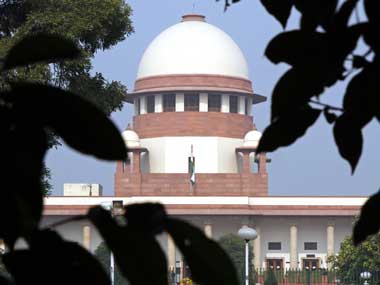New Delhi: The Supreme Court was today told that it has entered into legislative domain by attempting to frame guidelines for media for covering court proceedings and was cautioned that a careful approach was needed so that freedom of press is not abridged. Senior advocates Shanti Bhushan and Anil Divan submitted that any guidelines framed by the court “must not infringe” on the Constitution as they “cannot be challenged” and become “immune from judicial review”.[caption id=“attachment_271632” align=“alignleft” width=“380” caption=“Supreme Court of India. Reuters”]
 [/caption] “I cannot challenge your guidelines but if Parliament makes any guidelines, I can challenge them before you,” Divan, appearing for The Hindu, submitted before a Constitution bench headed by Chief Justice SH Kapadia. He said the guidelines which will be laid down through a judgement of the apex court cannot be challenged on grounds of breach of freedom of speech and expression under Article 19 (1)(A) and as such “guidelines become immune from judicial review”. Bhushan, who was appearing for a scribe, said freedom of press should not be curtailed in any way. “And the only guidelines which would be Constitutional would be that the media would not publish anything which it knows is not true or which has been published with reckless disregard of whether it was false or not,” he said. Senior advocate PP Rao, appearing for Press Council of India, said that there are adequate guidelines for print media for covering court proceedings but electronic media is not under its ambit. “The Council will be privileged to assist this Constitution bench in framing of guidelines that balance the rights of the affected parties with the duties of the media to report matter of public interest,” he said. Maintaining that the exercise carried by the court was not prudent in view of globalisation of technology on information dissemination, Divan said if the guidelines will be coercive or binding in nature then it is covered by the legislative process. On his submission, the bench said the deliberation on the guidelines was not a result of adversarial litigation and it was only trying to regulate the media to the extent that the rights of person in criminal cases be protected under the Article 21 (Right to life and liberty). “Give us your suggestion if you feel they (accused, victims and witnesses) need protection, vis-a-vis Article 21,” the bench, also comprising justices DK Jain, SS Nijjar, Ranjana Prakash Desai and JS Kehar asked Desai. Bhushan, who was arguing that “reasonable restrictions” prescribed in the Constitution, said it was not for the purpose of stifling the fundamental right of people. Burning issues will keep coming to the court and people should not be prohibited from receiving information which is their right, he said. When the bench told him that it was only deliberating for laying guidelines for “temporary ban” on publication without disturbing the contents to protect the fundamental rights of accused, victims and witnesses under Article 21, Bhushan said “it cannot be done” as “trained” trial court judges cannot be carried away by media reports of the cases in hand. His view was earlier supported by senior advocate KK Venugopal, who said right to know is part of Article 19(1)(A) and fair and accurate reporting of sub-judice matter is permitted and postponement of a publication will kill the news value of the proceedings. “Judges are robust people. They are trained in law of evidence, IPC, Cr PC, etc and they can’t be swayed by media reports. Public debate help the course of justice,” Bhushan said. He mentioned the 1976 judgement of the Constitution Bench in ADM Jabalpur case relating to the Emergency and said the fundamental right was abridged in that case by the judges with the solitary exception being Justice HR Khanna. He said subsequently it was felt by the apex court itself that restricting the fundamental right of life was a mistake. PTI
[/caption] “I cannot challenge your guidelines but if Parliament makes any guidelines, I can challenge them before you,” Divan, appearing for The Hindu, submitted before a Constitution bench headed by Chief Justice SH Kapadia. He said the guidelines which will be laid down through a judgement of the apex court cannot be challenged on grounds of breach of freedom of speech and expression under Article 19 (1)(A) and as such “guidelines become immune from judicial review”. Bhushan, who was appearing for a scribe, said freedom of press should not be curtailed in any way. “And the only guidelines which would be Constitutional would be that the media would not publish anything which it knows is not true or which has been published with reckless disregard of whether it was false or not,” he said. Senior advocate PP Rao, appearing for Press Council of India, said that there are adequate guidelines for print media for covering court proceedings but electronic media is not under its ambit. “The Council will be privileged to assist this Constitution bench in framing of guidelines that balance the rights of the affected parties with the duties of the media to report matter of public interest,” he said. Maintaining that the exercise carried by the court was not prudent in view of globalisation of technology on information dissemination, Divan said if the guidelines will be coercive or binding in nature then it is covered by the legislative process. On his submission, the bench said the deliberation on the guidelines was not a result of adversarial litigation and it was only trying to regulate the media to the extent that the rights of person in criminal cases be protected under the Article 21 (Right to life and liberty). “Give us your suggestion if you feel they (accused, victims and witnesses) need protection, vis-a-vis Article 21,” the bench, also comprising justices DK Jain, SS Nijjar, Ranjana Prakash Desai and JS Kehar asked Desai. Bhushan, who was arguing that “reasonable restrictions” prescribed in the Constitution, said it was not for the purpose of stifling the fundamental right of people. Burning issues will keep coming to the court and people should not be prohibited from receiving information which is their right, he said. When the bench told him that it was only deliberating for laying guidelines for “temporary ban” on publication without disturbing the contents to protect the fundamental rights of accused, victims and witnesses under Article 21, Bhushan said “it cannot be done” as “trained” trial court judges cannot be carried away by media reports of the cases in hand. His view was earlier supported by senior advocate KK Venugopal, who said right to know is part of Article 19(1)(A) and fair and accurate reporting of sub-judice matter is permitted and postponement of a publication will kill the news value of the proceedings. “Judges are robust people. They are trained in law of evidence, IPC, Cr PC, etc and they can’t be swayed by media reports. Public debate help the course of justice,” Bhushan said. He mentioned the 1976 judgement of the Constitution Bench in ADM Jabalpur case relating to the Emergency and said the fundamental right was abridged in that case by the judges with the solitary exception being Justice HR Khanna. He said subsequently it was felt by the apex court itself that restricting the fundamental right of life was a mistake. PTI
Tread carefully on media guidelines: Lawyer urges SC
FP Archives
• April 10, 2012, 20:21:18 IST
Lawyer Shanti Bhushan, who was appearing for a scribe, said freedom of press should not be curtailed in any way.
Advertisement
)